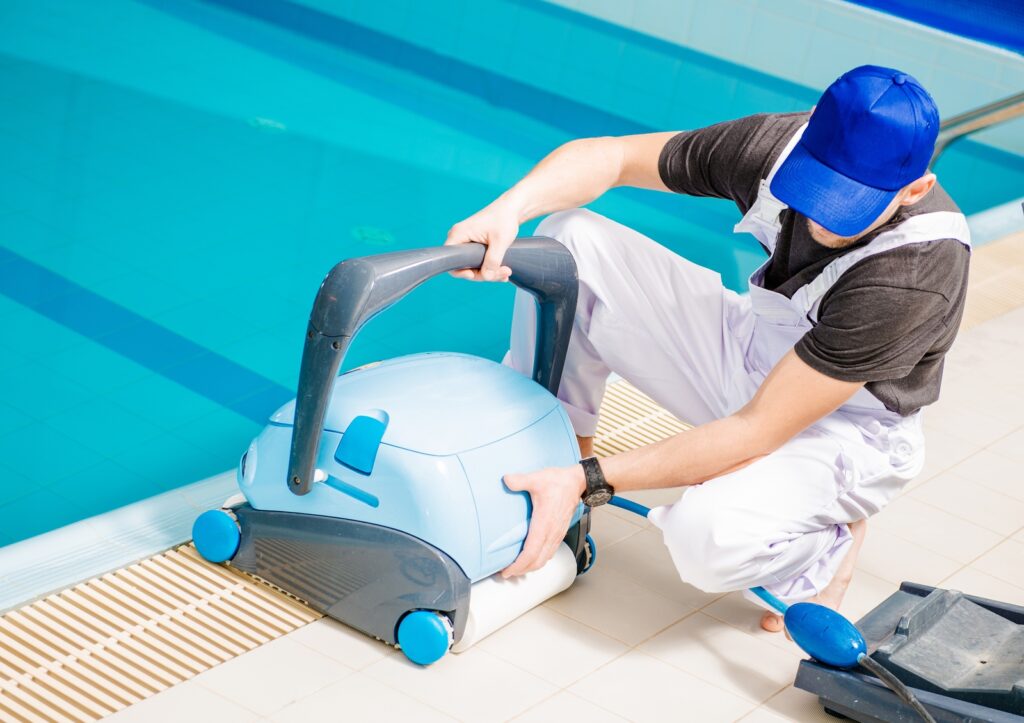Using traditional chemicals to maintain a pool can be costly and harmful to the environment. Eco-friendly pool cleaning provides a sustainable, non-toxic alternative that keeps water clean without harsh substances. Green pool maintenance tips help reduce chemical use, conserve water, and improve energy efficiency. This approach benefits the environment and swimmers by minimizing exposure to irritants and pollutants.
Why Choose Eco-Friendly Pool Cleaning?
Benefits of Green Pool Maintenance
Eco-friendly pool cleaning offers several advantages over conventional methods. Natural and non-toxic products reduce chemical exposure, making swimming safer for people and pets. Sustainable maintenance practices also help preserve local water sources by preventing chemical runoff.
Environmental and Health Advantages of Non-Toxic Pool Care
Switching to green pool maintenance reduces the use of chlorine and other harsh chemicals that can irritate skin and eyes. It also lowers the environmental impact by preventing harmful substances from entering groundwater. Energy-efficient pool equipment and water-saving techniques also contribute to a more sustainable pool care routine.

Sustainable Pool Cleaning Practices
Use Natural Pool Cleaning Products
Traditional pool chemicals contain harsh substances that can harm swimmers and the environment. Natural pool cleaning products like enzyme-based cleaners provide an effective alternative without toxic ingredients. These cleaners break down organic matter, helping to maintain clear water while reducing the need for chlorine and algaecides.
Non-toxic algaecides, such as those made from copper or botanical extracts, can help prevent algae growth without introducing harmful chemicals into the water. Choosing biodegradable and eco-friendly products ensures a safer swimming experience while protecting local ecosystems.
Optimize Pool Filtration for Energy Efficiency
A well-maintained pool filter is essential for reducing the need for chemical treatments. Energy-efficient pool pumps, such as variable-speed models, use less electricity while keeping water circulation effective. Properly sizing a pump to match the pool's volume can reduce energy waste.
Regular cleaning and backwashing of the pool filter prevent debris buildup, allowing for better water filtration. Cartridge and diatomaceous earth (DE) filters are more efficient than traditional sand filters, requiring less frequent cleaning and water conservation.
Reduce Water Waste with Smart Pool Management
Water conservation is a key part of green pool maintenance. Using a pool cover reduces evaporation, keeping water levels stable and minimizing the need for refilling. A high-quality cover also helps retain heat, reducing energy consumption for heating.
Following proper techniques when backwashing a pool filter prevents excessive water waste. Instead of frequently draining and refilling the pool, partial water replacement can help maintain water balance without unnecessary waste. Rainwater collection systems can supplement pool water, reducing reliance on municipal water sources.
DIY Green Pool Maintenance Tips
Use Baking Soda and Vinegar for pH Balance.
Traditional pool chemicals, such as pH adjusters and alkalinity increasers, can introduce unnecessary toxins into the water. Baking soda is a natural and cost-effective way to maintain alkalinity levels without harmful additives. Similarly, vinegar can help lower pH without relying on harsh acids.
When adjusting pool chemistry, small amounts of baking soda should be added gradually to increase alkalinity, while vinegar can be used in moderation to lower pH. Regular testing ensures that the water balance remains stable without excessive chemical intervention.
Harness the Power of Plants for Natural Filtration
Natural swimming pools use aquatic plants to help filter and oxygenate the water. Certain plant species, such as water lilies and reeds, absorb excess nutrients, preventing algae growth. While this method works best for pools designed as natural swimming environments, integrating plants around a conventional pool area can also improve water quality by reducing contaminants that enter the pool.
Regular Pool Skimming and Brushing
Routine maintenance is essential for reducing the need for chemicals. Skimming debris from the surface daily prevents organic matter from decomposing and affecting water quality. Brushing pool walls and floors helps remove algae buildup and minimizes the need for algaecides.
A robotic or solar-powered pool cleaner can enhance eco-friendly pool cleaning by reducing the electricity demand. These devices improve water circulation while collecting debris efficiently.
Eco-Friendly Pool Equipment and Upgrades
Solar-Powered Pool Heaters and Their Efficiency
Traditional pool heaters consume significant energy, increasing operational costs and environmental impact. Solar-powered heaters, on the other hand, provide a sustainable alternative by harnessing renewable energy to maintain comfortable water temperatures.
Installing solar panels for pool heating reduces reliance on gas or electric heaters, leading to long-term savings. Positioning solar collectors in an area with maximum sunlight exposure optimizes efficiency and extends the swimming season without excessive energy consumption.
Saltwater vs. Chlorine Pools: Pros and Cons for Sustainability
Saltwater pools offer a more sustainable approach to pool sanitation. By generating chlorine naturally through electrolysis, they still contain chlorine, require fewer chemical additives, and result in softer, less irritating water.
Saltwater systems require less maintenance and fewer chemical adjustments than traditional chlorine pools. However, they need an initial investment in a saltwater chlorinator, and some metals, such as copper, may corrode over time. Evaluating long-term costs and environmental impact can help determine the best solution for green pool maintenance.
Upgrade to a UV or Ozone Pool System
UV and ozone pool systems reduce the need for chlorine and other chemicals by neutralizing bacteria and contaminants. These systems use ultraviolet light or ozone gas to disinfect water more effectively than traditional chemical treatments.
While these systems require an initial investment, they lead to lower chemical usage, fewer irritants, and a reduced environmental footprint. Many pool owners find UV and ozone systems provide cleaner, healthier water with minimal ongoing maintenance.
Common Myths About Green Pool Maintenance
Debunking Misconceptions About Natural Pool Care
Many pool owners hesitate to switch to eco-friendly pool cleaning due to misconceptions about its effectiveness. One common myth is that natural pool care cannot keep water as clean as traditional chemicals. In reality, enzyme-based cleaners, saltwater systems, and UV purification provide sanitation levels equal to or better than chlorine-based treatments.
Another misconception is that green pool maintenance is expensive. While some eco-friendly upgrades, such as solar heaters or ozone systems, require an initial investment, they reduce long-term costs by lowering energy and chemical expenses. Over time, sustainable pool care can be more cost-effective than conventional methods.
Why Eco-Friendly Pools Are Just as Effective as Traditional Methods
Eco-friendly pool cleaning does not mean sacrificing water quality. With proper filtration, balanced water chemistry, and regular maintenance, pools can stay clear and safe without excessive chemical use. Green pool maintenance practices also prevent common problems like algae buildup and pH fluctuations, leading to a more stable and efficient pool system.
Frequently Asked Questions on Eco-Friendly Pool Cleaning
Can You Maintain a Pool Without Chlorine?
A pool can be maintained with little to no chlorine by using alternatives such as saltwater systems, UV sanitizers, and ozone generators. Natural cleaning agents, such as hydrogen peroxide and mineral-based purifiers, can also help disinfect water safely.
How Often Should an Eco-Friendly Pool Be Cleaned?
Green pool maintenance requires consistent upkeep, just like traditional methods. Skimming debris daily, testing water chemistry weekly, and cleaning filters regularly ensure the pool stays clean and balanced. Sustainable practices help reduce the workload by minimizing the buildup of contaminants.
What Are the Best Sustainable Alternatives to Pool Shock Treatments?
Instead of using high doses of chlorine shock, pool owners can opt for non-chlorine oxidizers, such as hydrogen peroxide or potassium monopersulfate. These treatments effectively break down organic contaminants without harmful byproducts. Regular circulation and proper filtration also reduce the need for shock treatments.
Make the Switch to Eco-Friendly Pool Cleaning Today!
Adopting eco-friendly pool cleaning methods benefits both the environment and swimmers. By using sustainable products, upgrading to energy-efficient equipment, and practicing responsible maintenance, pool owners can enjoy clean, safe water without harmful chemicals. For expert green pool maintenance, explore the directory to locate a trusted pool cleaning service near you today.
